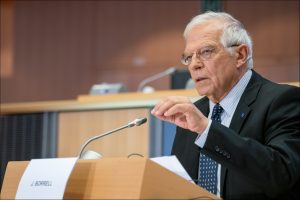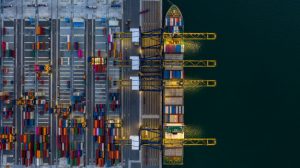
The European Union’s position to support the sovereignty and territorial integrity of Ukraine is unchanged, High Representative/Vice-President Josep Borrell said. High Representative/Vice-President Josep Borrell gave such assurances to Minister of Foreign Affairs of Ukraine Dmytro Kuleba during a telephone conversation on Tuesday, April 21 before the meeting with EU Foreign Affairs Ministers, which will also consider the Ukrainian issue. This was announced by the EU press service on Wednesday.
“High Representative Borrell underlined the EU’s steadfast support to Ukraine’s sovereignty and territorial integrity. He welcomed Ukraine’s continued reform efforts, highlighting in particular the importance of the banking law in this regard,” the message reads.
He also highlighted the EU’s support to Ukraine in response to the coronavirus outbreak. EUR 190 million has been allocated to Ukraine, to support the health sector and social and economic recovery. In that context, they also emphasized the importance to counter disinformation surrounding the pandemic.
“They discussed the recent release and exchange of detainees related to the conflict in eastern Ukraine that took place on 16 April, and the need to continue work to implement the Minsk agreements,” the press release reads.
High Representative Borrell looked forward to visiting Ukraine as a priority once the conditions allow.

Transport enterprises of Ukraine (excluding the territory of the Autonomous Republic of Crimea and Sevastopol, as well as part of the Joint Forces Operation zone) reduced cargo transportation by 13.1% in January-March 2020 compared to January-March 2019, to 140.7 million tonnes, the State Statistics Service has reported.
According to its data, freight turnover of carriers for the specified period decreased by 14.9%, to 68.853 billion tonne-kilometers.
According to statistics, in the first quarter of 2020, 37.9 million tonnes of cargo were transported by rail in domestic traffic and for exports, which is 4.1% less than in January-March 2019. Some 43.7 million tonnes (17.9% down) were transported by road, 900,000 tonnes (12.6% less) by water, 22.2 million tonnes (27.6% less) by pipeline, and 20,000 tonnes (13.6% less) by airlines.

Chemical Alliance LLC (ChemAlliance) has launched a plant for the production of liquid complex fertilizers with a capacity of 50,000 tonnes per year in Poltava region in the middle of April. According to the company’s press release on Tuesday, April 21, the first batch of finished products have already been produced and shipped to customers. Fertilizers at the Poltava plant are produced using acid synthesis technology. The total capacity of the enterprise is 50,000 tonnes of liquid complex fertilizers per year. The complex produces fertilizers under the BlauPhos trademark.
The company told Interfax-Ukraine that investments in opening the plant in Poltava region amounted to about EUR 2 million.
Chemical Alliance LLC (Poltava) was established in 2010. It is engaged in production and sale of liquid mineral and granular fertilizers.

The second plant for the production of automotive electronics of Kostal Ukraine LLC, a subsidiary of Germany’s Leopold Kostal GmbH & Co, will be constructed in Boryspil district of Kyiv region, the press service of Boryspil district state administration has said.
“Despite quarantine in the country, cooperation with foreign investors continues. Recently, Boryspil district state administration and Kostal Ukraine LLC have signed a memorandum of cooperation and interaction under the project to construct the plant for the production of mechatronic products (automotive electronics) in the territory of Dudari rural council. The main office in Germany confirmed the intention to construct the plant,” the press service said on the website of the district state administration.
There are intentions to create 900 jobs at the plant.
Currently, Kostal Ukraine has a production site of automotive components in Pereiaslav (Kyiv region), established in 2006, where about 1,000 employees are currently working.
KOSTAL Group consists of 31 companies in 17 countries. The main activities are the development and production of technologically advanced electronic and electro-mechanical products for the automotive industry.

Ukraine’s Minister of Infrastructure Vladyslav Krykliy expects provision of financial support to Ukrzaliznytsia in the amount of UAH 4-5 billion from the funds received from Gazprom, he said in an exclusive interview with Interfax-Ukraine.
According to the minister, financial support on behalf of the state will be the most liquid aid for Ukrzaliznytsia in the current situation, taking into account the previously downgraded rating of the company by S&P Global Ratings to “CCC” with a negative outlook.
“Part of funds from Gazprom, which goes to Naftogaz, will be transferred to the budget in the form of dividends, we expect to receive a certain amount that will be provided to support Ukrzaliznytsia. But not just to close the current problems, but to order wagons, trains, etc. in the domestic market,” the minister emphasized.
Krykliy also said that the Ministry of Infrastructure plans to receive about UAH 4-5 billion of targeted financing for Ukrzaliznytsia.
“We expect that these funds will arrive this year, and will be distributed by the end of the year,” he stressed.

Retail goods turnover in Ukraine in March 2020 slowed to 6.1% year-over-year in comparable prices, the State Statistics Service has reported.
In January-March 2020 compared with January-March 2019, retail trade turnover decreased 10.6%, while in March 2020 compared to February 2020 it increased by 4.4%.
The largest increase in the retail turnover of enterprises (legal entities and private entrepreneurs) in March 2020 compared with March 2019 was recorded in Kyiv (by 15.3%), Dnipropetrovsk (by 15%), Kharkiv (by 14.9%), Zaporizhia (by 14.8%), Kirovohrad (by 13.9%), Poltava (by 12.8%), Volyn (by 12.6%) and Odesa (by 12.4%) regions.